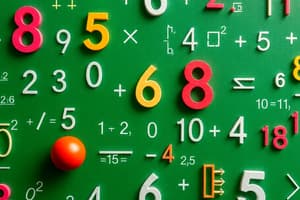Podcast
Questions and Answers
Explain the role of axioms and theorems in the mathematical process.
Explain the role of axioms and theorems in the mathematical process.
Axioms are fundamental assumptions that are accepted without proof, while theorems are statements that are proven using logic and previously established theorems. Both play a vital role in building the structure of mathematics by providing foundational truths and deriving new knowledge.
Describe the relationship between rational and irrational numbers.
Describe the relationship between rational and irrational numbers.
Rational numbers can be expressed as a ratio of two integers, while irrational numbers cannot be expressed as such. They are distinct sets within the broader category of real numbers. Examples of rational numbers include 1/2, 3, and -4/5, while examples of irrational numbers include pi and the square root of 2.
Why is the order of operations (PEMDAS/BODMAS) important in mathematical calculations?
Why is the order of operations (PEMDAS/BODMAS) important in mathematical calculations?
Order of operations ensures consistency and accuracy in calculations by dictating the priority of different operations. This eliminates ambiguity and guarantees that everyone arrives at the same solution for a given expression.
What is the significance of variables in algebra?
What is the significance of variables in algebra?
How do complex numbers extend the number system?
How do complex numbers extend the number system?
Flashcards
Mathematics
Mathematics
A formal system of logic used to quantify and model the world.
Number Systems
Number Systems
Categories of numbers including natural, whole, integers, and more.
Rational Numbers
Rational Numbers
Numbers that can be expressed as a fraction p/q where q ≠ 0.
Order of Operations
Order of Operations
Signup and view all the flashcards
Algebra
Algebra
Signup and view all the flashcards
Study Notes
Fundamental Concepts
- Mathematics is a formal system of logic and reasoning used to quantify, describe, and model the world around us.
- It encompasses a wide range of topics including arithmetic, algebra, geometry, calculus, and more.
- Key areas of study include numbers, operations, equations, functions, and spatial relationships.
- Mathematics relies on axioms, postulates, and theorems to develop and justify its conclusions.
- Concepts such as proof and deduction are central to the mathematical process.
Number Systems
- Natural numbers (counting numbers) are positive integers starting from 1.
- Whole numbers include natural numbers and zero.
- Integers encompass whole numbers and their negative counterparts.
- Rational numbers can be expressed as a fraction p/q, where p and q are integers, and q is not zero.
- Irrational numbers cannot be expressed as a fraction of two integers.
- Real numbers include all rational and irrational numbers.
- Imaginary numbers are numbers involving the square root of -1 (denoted as 'i').
- Complex numbers are a combination of real and imaginary numbers (a + bi).
Arithmetic Operations
- Addition (+) combines two or more quantities.
- Subtraction (-) finds the difference between two quantities.
- Multiplication (× or *) combines a quantity multiple times.
- Division (÷ or /) separates a quantity into equal parts.
- Order of operations (PEMDAS/BODMAS) dictates the sequence of calculations.
Algebra
- Algebra uses variables (letters) to represent unknown quantities.
- Equations relate two expressions with an equal sign.
- Inequalities relate two expressions with a sign like >, <, ≥, or ≤.
Studying That Suits You
Use AI to generate personalized quizzes and flashcards to suit your learning preferences.




